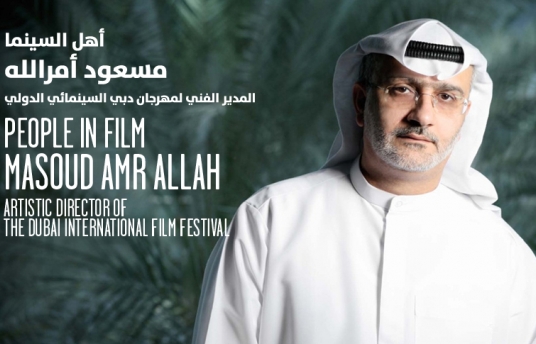People in Film: Masoud Amr Allah
May 01, 2012

DFI: This is the 5th edition of the Gulf Film Festival (GFF), how do you see it develop and what’s new this year?
Amr Allah: I don’t think the festival develops as much as films do. I recall in 1997, during an interview, I was asked about the barriers of cinema in the Gulf. I responded spontaneously saying, “You shouldn’t beat the dead.” At that stage there was no cinema in the GCC to speak of, therefore, the question was pointless. It’s similar to asking why we can’t plant apples in the Gulf.
However, in the last 15 years things have changed drastically in the Khaleeji cinema scene. There’s been a remarkable development and I could never repeat that answer I gave years ago. Now, there’s light at the end of the tunnel.
The Gulf Film Festival is the result of several trials from various GCC countries to create a cinema industry. What we are reaping today are the efforts of the last 10 years. Currently there are many film festivals in the GCC including small initiatives on a school level. We’re walking with sure and calm steps.
I find this 5th edition to be exceptional, gathering the best talents from different generations who have a lot to share and are the most important attendees of such a festival.
We don’t want to just create international film festivals, because in my opinion the ‘Internationals’ are coming to see what ‘locals’ are doing. If we continue to develop the film industry in our region, it will eventually reflect our image as a society and as a country. This has become a priority and the GFF is working towards achieving this goal, as is the Doha Film Institute with its educational initiatives . We all want to create and promote our films, our stories.
DFI: We noticed there’s a specific identity to the festival: how did you achieve that feeling of belonging, where GFF represents ‘home’ for GCC artists?
Amr Allah: When you feel that you’re home, it means you’re comfortable and are more than just a guest. This festival has a certain warmth to it. The GCC countries have a lot in common be it in reference to tradition, dialect, or our general way of thinking… even in the progress or degradation of cinema. That’s why the secret of success or failure of the festival relies on how intimate the spirit around it is.
For instance we’re the same team that runs the Dubai International Film Festival but most filmmakers feel more comfortable here, closer to each other, even if their films are screened at DIFF.
This festival is created for them, and what distinguishes both is that each boasts a different structure, character and goals. In GFF, when filmmakers walk the red carpet, they’re the stars without being upstaged by the international celebrity. That’s why this experience and this place means a lot to them.
If anyone wants to have a crash course on Khaleeji cinema, all they have to do is come to GFF. They’ll learn about student films, professional works, current actors… all of whom insist on being here because of the festival’s unique identity.
In my opening speech I said that I consider this year to be the year of loyalty because there’s loyalty between the filmmakers and the festival – that’s the magic of it. We strongly encouraged some filmmakers to produce films for the festival – this has now become their motive as opposed to the festival being only a networking hub.
DFI: What message do you want to pass onto upcoming filmmakers?
Amr Allah: What I really wish to see, before going to make films, is to be aware of what’s happening around us. The problem in the GCC is that everyone wants to be a film director when other special skills have become a rarity.
The director’s job is the most difficult of all because they have to be of great general knowledge, not only technically but in politics, psychology and so many other fields in order for them to be in control. When directors deal with an actor, they’re dealing with their psyche not just the acting, so emotional intelligence is a must.
One of the first things lacking is a good background in film. It’s ok to make commercial films but you have to be aware of art house films and various other genres and forms of expression as well. Cinema is culture and not just entertainment as it’s been promoted regionally. Documentaries for instance, which we lack in the GCC, are like bullets; if you are not well informed of what your own society is like, then your self-representation remains at a weaker standard, and you are at risk of becoming another superficial eye. These are the key elements to reach and be closer to the memory, culture and dialect of the people. This is so important.
You shouldn’t underestimate cinema now that we have the tools to make it easier to make films. Nevertheless, a filmmaker has to earn the respect of audiences and keep learning. And don’t underestimate the audience; they’re much smarter than we think.